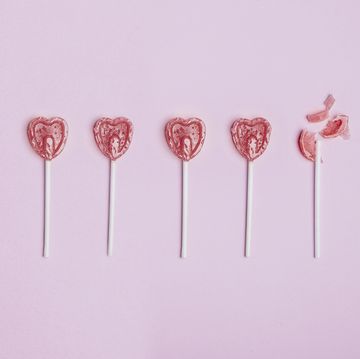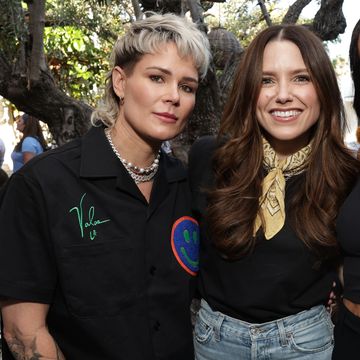Deep down, we're all animals in bed. After all, sex is an extremely primal act, and when we use our verbal human brains to talk about it—and sometimes during it—it's clear that the tongue and the groin are linked (in a much less graphic way than you're picturing right now).
"Language communicates not only information but also meaning and feelings and symbols of internal realities," says Jeremy Nicholson, Ph.D., a psychologist in Boston. "We can use it to make sex better in a mechanical, instructional sense, but it also makes the act more meaningful."
In fact, a few choice words can set off the arousal response as swiftly as a sensual touch (especially in women, who are more turned on by ideas than by visuals), but an off-color or way-too-raunchy phrase from a dude in your bed can turn you off just as quickly. Read on to learn how language affects your sex life and how you can use your words to make sex so awesome, you'll find it hard to speak.
During the Deed
Two excellent reasons to eschew silent sex: By piping up, you can help your guy make you feel good and make things hotter for him. So why are we so scared to raise our voices? "People aren't taught how to talk erotically," says Ava Cadell, Ph.D., a sexologist in Los Angeles and founder of LoveologyUniversity.com. "We're left fumbling, trying to figure out what to say."
We tend to default to what we'd like to hear, she adds, which is often very different for men and women. Psychologists know that women are turned on by erotic storylines and emotional talk (cough, cough.. Fifty Shades of Grey), while men gravitate toward visual language and explicit talk (cough, pornography, cough). That's why, just when you're working up the nerve to moan "I love you," he might take the opportunity to announce that he loves your breasts. Also, not to get all "men are from Mars," but psychologists have established that males and females use their words differently. "In general, men are more explicit and direct with their speech, while women tend to be more emotional and experiential with their language," says Nicholson.
What further complicates it is that, in all the excitement, the words that come out of his mouth may be along the lines of "Yeah, you like that, you [completely inappropriate and startling synonym for prostitute].'' "It can be unsettling when he suddenly says something dirty," says Nicholson. "You might think, Whoa, he's having sex, while I'm making love." But this may only mean that he has seen one too many pornos and is just parroting the dialogue.
Making it work: Too sheepish to get vocal? To up your sigh-Q, "pretend you're 10 times bolder than you actually are," suggests Cadell.
Take a breath and feign confidence. Then start with heavy breathing, working up to two standbys: his name and yes, she adds. When you see that he loves it, you won't have to fake the boldness (or anything else, for that matter).
If you want him to be more vocal, get all up in his neck and whisper-ask him what he'd like to do to you, adding, "Don't leave out any details." Wish he'd tone it down instead? Murmur, "Dirty talk isn't my thing, but I want you to whisper in my ear about how this feels." Then respond appropriately when he follows your lead. "This is a classic conditioning trick," says Nicholson. "You're giving him an alternative behavior and rewarding him for doing it."
RELATED: The science behind pillow talk
Talking It Over
Raise your hand if you've heard this already: Being able to talk about your sex life translates to a better time in the bedroom. Some sample topics that are hugely important but kinda hard to discuss while he's fumbling to get the condom on or off: what worked for you, what you want more of, whether you'd like to have sex more often, more slowly, or while wearing stripper heels.
Making it work: A casual time to broach the topic without feeling too awkward? While watching a TV show or movie in which the characters talk about their love lives. "Use an upbeat, casual tone," advises Nicholson. "Men aren't so good at talking about sensitive topics, but if you sound confident, you'll put his mind at ease."
Another prime time to talk, believe it or not, is during the early part of foreplay—like, when you're making out and still dressed. "This is the right time to give him specific sex tips," says Nicholson. After all, logically, "instructions are helpful right before you do something," he notes. And if you purr some pointers in advance of the main event, they'll actually become part of the fun. Cadell likes a game called "I bet you didn't know I . . . " in which you take turns completing the sentence with phrases such as "want you to come first tonight" or "think it's hot when I leave my skirt on." Yes, the "let's play a game" line will take a little guts. But we promise—he'll love it.
Make 'Em Say Mmmm . . .
What's up with all those wordless vocalizations you can't help but utter when your partner is knocking it out of the park? Those oohs and ahhs are a product of both genes and culture, experts say.
The animal kingdom gives us a hint of what we're holding over from our primate roots. "In monkeys, female vocalization increases the likelihood of male orgasm," says psychologist David J. Ley, Ph.D., author of The Myth of Sex Addiction. Female cries of pleasure draw the attention of other monkeys. "So the male who's in the saddle is prompted to ejaculate sooner and harder to compete with other potential mates who might come along." Among humans, "female vocalizations seem to provoke male orgasm," adds psychologist Christopher Ryan, Ph.D., coauthor of Sex at Dawn. In other words: Your happy noises really speed him along.
Men's much quieter approach to sex also might be an evolutionary mechanism—in this case, to avoid attracting other monkeys' attention, thus keeping the she-monkey to oneself. "But it may also reflect the male tendency toward stoicism, a quality that's socially reinforced," adds Ley.
Letting go of inhibitions and making sounds during sex can have the nice effect of tricking yourself into being more aroused. "It's the fake-it-till-you-make-it idea," says Rose Hartzell, Ph.D., a sex therapist at San Diego Sexual Medicine.
RELATED: The science behind pillow talk














